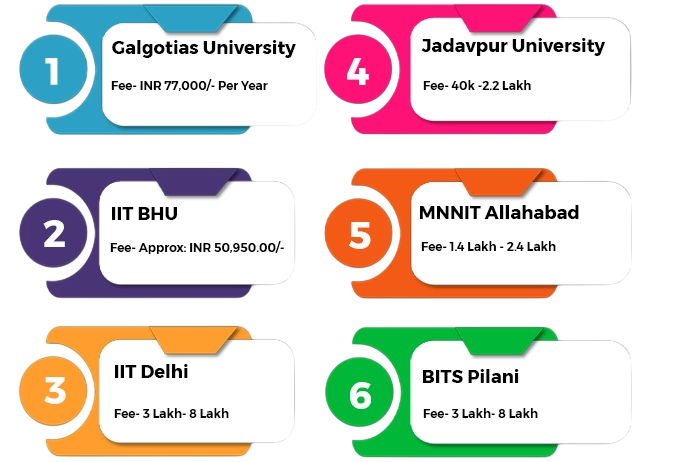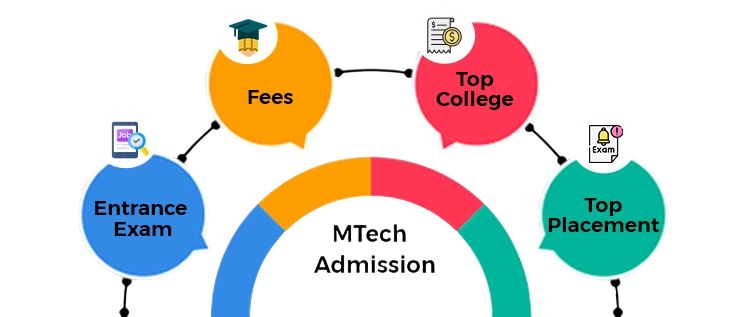
- Why Optional for M.Tech?
- Different M.Tech Specializations
- M.Tech Career Prospects
- M.Tech Eligibility
- Finding M.Tech Colleges
- Entrance Exams for M.Tech Admission
- The Application Process
- Conclusion
Why Optional for M.Tech?
After a college B.Tech or B.E. degree, a majority of students are at a crossroads as to whether they should get a job or continue their studies with a master’s degree. The choice of a student is a reflection of his/her career and personal goals first and foremost. First of all, an M.Tech program can present a student with a wide array of benefits, among which is the intense focus on one specific field which in turn leads to the student becoming a real expert in that particular area. To complement this academic specialization with industry-relevant skills, explore Placement and Softskills Training a structured program designed to enhance communication, interview readiness, and workplace adaptability for students transitioning into competitive professional environments. Also, the value of an M.Tech degree is very high and it can lead to the widest career possibilities as the holder of such a degree can be a top choice for elite companies like Google and Microsoft, and can get easy access to senior positions with high salaries. An advanced degree like this gives one a chance to pursue a Ph.D. or other research-based opportunities besides the immediate career benefits. By weighing the factors, students can make the right decision that is in accord with their long-term professional and academic goals and hence, enabling them to be leaders in a highly competitive technological world.
Different M.Tech Specializations
- M.Tech in Mechanical Engineering (ME): Offers advanced training in mechanical engineering, covering design, production, thermal engineering, materials technology, and industrial engineering. Students can specialize in areas of interest through electives. The curriculum includes theoretical learning, practical training, and research projects. Graduates are qualified for leadership roles, research positions, and specialized careers in mechanical engineering industries.
- M.Tech in Electrical Engineering: Provides theoretical and practical knowledge in electronics, power systems, and electromagnetic fields. Topics include power electronics, circuits, microcontrollers, VLSI design, energy systems, and industrial electrical systems, all of which are integral areas of study for M.Tech Working Professionals. Career options include power system engineer, power electronics engineer, electrical project manager, embedded systems engineer, VLSI design engineer, and electrical design engineer.
- M.Tech in Computer Engineering: Focuses on advanced computer engineering concepts and their applications across domains. Covers computer architecture, networking, software design, VLSI access, cloud computing, AI systems, data structures, and algorithms. Graduates can work as software developers, engineers, programmers, IT administrators, and EDP computer operators.
To Explore Soft Skill in Depth, Check Out Our Comprehensive Soft Skill Certification Training To Gain Insights From Our Experts!
M.Tech Career Prospects
- M.Tech in Chemical Engineering: Offers a career in industrial chemical engineering by providing skills in risk management, business awareness, and production technologies. Topics include product development, process engineering, and fluid dynamics. Career options include process engineer, plant head, chemical engineer, and quality control engineer.
- M.Tech in Civil Engineering: Provides advanced knowledge in civil engineering disciplines such as structural, geotechnical, transportation, environmental, and water resources engineering, making M.Tech Admission in NITs a valuable pathway for specialization. Combines theory with practical applications and research projects. Graduates are prepared for leadership roles, research positions, and specialized careers in both public and private sectors.
- M.Tech in Artificial Intelligence: Focuses on the study and practical understanding of AI. Graduates can pursue careers in healthcare, finance, and technology sectors.
- M.Tech in Cyber Security: Designed to equip students with specialized skills in protecting digital systems, networks, and data from cyber threats.
- IITs (Indian Institutes of Technology): The undisputed royalty of engineering education. IITs offer world-class faculty, cutting-edge research facilities, and massive brand value. Getting into an IIT M.Tech is tough but incredibly rewarding.
- NITs (National Institutes of Technology): Solid institutions with a strong reputation. They are often the next best choice after IITs, offering quality education at a more accessible level.
- IISc Bangalore: A premier research institution, especially if you’re leaning towards research-heavy M.Tech programs.
- Central Universities & State Universities: Many government universities offer good M.Tech programs. Keep an eye on their specific admission processes and faculty expertise.
- Reputable Private Institutions: Some private universities have invested heavily in their engineering departments and offer excellent M.Tech courses.
- Research: Identify your preferred specialization and the colleges that offer it. Read up on faculty research areas.
- Exam Preparation: Dedicate sufficient time to GATE or other entrance exams.
- Application Forms: Fill out the online application forms meticulously. Double-check everything.
- Admit Cards: Download and keep your admit cards safe for entrance exams.
- Exams: Show up, do your best, and try not to panic.
- Results & Merit Lists: Wait anxiously for results and check where you stand.
- Counseling/Interviews: Some colleges have a counseling process or personal interviews, especially for popular specializations or for direct admissions.
- Admission & Fee Payment: If selected, complete the admission formalities and pay the fees within the stipulated deadlines.
Are You Interested in Learning More About Soft Skill ? Sign Up For Our Soft Skill Certification Training Today!
M.Tech Eligibility
Aspiring candidates pursuing an M.Tech, navigating the admission landscape requires careful preparation across multiple dimensions. A Bachelor’s degree in engineering (B.E./B.Tech) from a recognized university serves as the foundational prerequisite, with some specialized programs potentially accepting Master’s in Science (M.Sc.) qualifications. Academic performance is critical, with most institutions demanding a minimum aggregate score ranging between 55–60%, underscoring the importance of maintaining a competitive academic profile. To complement strong academics with communication, confidence, and career-readiness, explore Softskills Training a focused program that helps students enhance interpersonal effectiveness, present ideas clearly, and succeed in interviews and collaborative environments. Prospective students must also pay close attention to discipline-specific requirements, as certain M.Tech specializations such as VLSI mandate specific undergraduate subject foundations. Moreover, gaining admission typically involves successfully clearing rigorous entrance examinations, which act as gatekeepers to advanced technical education. These competitive exams function like selective filters, ensuring only the most qualified and dedicated candidates progress to advanced academic opportunities in their chosen technological domains.
Finding M.Tech Colleges
Choosing the right college is like picking a partner for a dance – you want someone who complements your rhythm and helps you shine. India has a plethora of fantastic institutions offering M.Tech programs, making the decision even more significant when considering MBA vs MTech – Career Scope.

Are You Considering Pursuing a Master’s Degree in Soft Skill? Enroll in the Soft Skill Masters Program Training Course Today!
Entrance Exams for M.Tech Admission s
India has different engineering entrance exams that are recognized in the different states as well as at the national level. Among these is the Graduate Aptitude Test in Engineering (GATE), which is a prestigious examination at a national-level. The examination is recognized for admissions to Post-Graduate courses and is conducted by the GATE Committee that is composed of faculty from IISc and IITs, making MTech Entrance Exams Tips highly valuable for aspirants preparing to excel. Candidates who have scored not less than 60% in their respective bachelor’s degree can take GATE, which is a test accepted by IITs, NITs, BITS Pilani, etc. In addition to this, there are state-level entrance examinations like Tamil Nadu Common Entrance Test (TANCET), Odisha Joint Entrance Examination (OJEE), and Telangana State Post Graduate Engineering Common Entrance Test (TS PGECET) that offer regional engineering students the opportunity to get admission in their states or localities only. These exams usually require a minimum of 50-60% for the graduation aggregate score; however, some reserved category candidates are given some relaxations. Of special mention is GATE, which is inclusive in nature and thus opens up the exam for candidates from few international locations like Nepal, Bangladesh, and Singapore. This is a way of making education more accessible across engineering disciplines.
Are You Preparing for Soft Skill Jobs? Check Out ACTE’s Soft Skill Interview Questions & Answer to Boost Your Preparation!
The Application Process
Applying for M.Tech admission is a marathon, not a sprint. It involves several stages, and exploring Professional Courses After Graduation can provide the right preparation and direction for success.

Conclusion
Admission to M.Tech applications entails assembly precise eligibility criteria, generally requiring an applicable undergraduate diploma in engineering or generation with a minimal qualifying percentage. Candidates commonly want to clear front tests which include GATE, that is extensively universal throughout most beneficial institutes, or diverse state-level and college-specific tests. Choosing the proper university relies upon elements like specialization, faculty, infrastructure, placement records, and accreditation. To complement your entrance exam strategy with career readiness and communication excellence, explore Softskills Training a focused program designed to help students build confidence, improve articulation, and succeed in interviews and collaborative academic environments. While charges range extensively among authorities and personal institutions, potential college students have to additionally not forget scholarships, monetary aid, and go back on funding whilst making their decision. Overall, thorough studies and instruction are vital to stable admission into a good M.Tech software that aligns together with your profession desires and aspirations.





